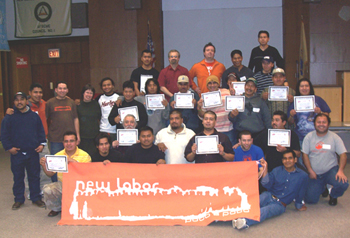
OTEC is partnering with employers and worker centers to improve conditions and reduce occupational injuries and exposures among immigrant and other low-wage workers. Through briefings, compliance training, the development of site-specific training programs, job analyses and plant-wide surveys, employer and employee focus group meetings, and one-on-one interviews, we are also collecting data and gaining a better understanding of how low-wage industries are organized and the problems they pose for workers, employers, and the future of work in New Jersey. See the testimony before the Assembly Outsourcing and Off-Shoring Commission.
Training Partnerships
The Latino Occupational Safety and Health Initiative (LOSHI)
OTEC and New Labor created the Latino Occupational Safety and Health Initiative (LOSHI) to address the growing number of occupational injuries and fatalities among low-wage Latino workers. Led by OTEC co-director, Carmen Martino, LOSHI develops customized training programs for employers, unions, and community-based organizations.
 LOSHI’s provides low-wage Latino workers and their employers with the tools they need to reduce and eliminate workplace injuries and illnesses. LOSHI’s Spanish language safety and health training is offered to Latino workers through employers, worker centers, unions, and community and faith-based organizations. Over the past six years LOSHI has provided training to more than 2,200 workers, trained 159 Peer-to-Peer (P2P) worker trainers, and accumulated more than 18,000 hours of training.
LOSHI’s provides low-wage Latino workers and their employers with the tools they need to reduce and eliminate workplace injuries and illnesses. LOSHI’s Spanish language safety and health training is offered to Latino workers through employers, worker centers, unions, and community and faith-based organizations. Over the past six years LOSHI has provided training to more than 2,200 workers, trained 159 Peer-to-Peer (P2P) worker trainers, and accumulated more than 18,000 hours of training.
Relying on years of experience in developing participatory health and safety training programs, we have acquired a national reputation for our work with low-wage Latino workers.
In 2004–05, LOSHI partnered with a light industrial manufacturer that produces consumer products for Johnson & Johnson, Unilever, and Church and Dwight. We developed a site-specific Emergency Response Preparedness training program for the manufacturer’s temporary and full-time employees. Ninety percent (90%) of the workforce was supplied by a national temporary employment service firm. New Labor P2P trainers delivered the ERP training to the entire workforce, which at the time included 60 temporary employees.
In a follow up to the ERP training, LOSHI assisted the client firm manufacturer and temp agency in establishing and training a plant wide health and safety committee that was made up of client firm supervisors and temp agency frontline staff.
In 2006, LOSHI partnered with a food processing company based in Elizabeth, New Jersey and developed a site-specific Emergency Response Compliance program. Over 400 employees received eight hours of training and the company’s OSHA reportables were reduced by 30 percent. The success was due in large part to the efficient delivery of a comprehensive program that we developed through many years of experience. Comprehensive LOSHI programs improve the critical thinking and group problem-solving skills of workers and provide them with opportunities to not only participate but also take ownership of their health and safety on the job.
Currently LOSHI is establishing relationships with warehouses through employer briefings and training initiatives. In 2007–08, LOSHI sponsored employer briefings that specifically targeted warehouses along the Turnpike corridor between exists 7a and 8a. Our goal is to create a network of warehouses that will work together to maximize resources and provide improved and safer conditions of work for fulltime and temporary warehouse workers.
Current Research
Through a second five-year grant from the Center for Construction Research and Training and in collaboration with the N.J. Laborers International Union of North American, Local 55 and New Labor, the Safety Liaison Project is developing a core group of New Labor/LIUNA Local 55 Safety Liaisons who will conduct safety audits, train coworkers and supervisors, communicate with supervisors and contractors about hazardous conditions and serve as peer mentors on residential construction sites. We will evaluate the individual and combined impact of Safety Liaisons and worker training on the knowledge, attitudes, work practices, and worksite safety climate. We will broadly disseminate our curriculum, evaluation data, and descriptions of the intervention process.
In 2006–07, OTEC and New Labor partnered with a light industrial manufacturer and conducted a line operator’s job analysis. In addition, we conducted a plantwide survey of full-time and temporary employees to learn more about their views on management and expectations of future employment.
The job analysis was used to develop an operator’s training program. The survey helped us gain a better understanding of the communications problems that existed between the temp agency and full-time staff. We also observed, engaged, and asked questions of managers and supervisors who spoke English, and frontline production workers who spoke Spanish, as they attempted to bridge the cultural and communications divide in a work environment characterized by constantly fluctuating production and labor supply demands.
Working with New Labor in 2008, we conducted focus groups and completed a preliminary survey of full time warehouse and agency workers employed in the industry. The survey and focus groups were designed to enhance our knowledge and understanding of the experiences of immigrant Latino’s employed as temporary and fulltime warehouse workers in Central Jersey. In addition to the survey and focus groups, we have held LOSHI sponsored employer briefings that have helped us gain a better understanding of the health and safety challenges that exist in this industry as well as greater insights into how warehouse employers organize work and utilize temp workers. "Regular Work in an Irregular Economy."
Training Approach
OTEC relies on participatory training methods that are designed to keep participants active and engaged. Each curriculum module (activity) includes one or more specific tasks to be completed by small groups. Participants review a series of fact sheets that summarize relevant technical information and serve as a resource for completing each task. The tasks require participants to:
- draw on their own skills, knowledge, and experiences;
- utilize relevant technical information presented in the fact sheets;
- work with other team members.
Through this process participants utilize technical information to improve their team-based problem-solving, critical thinking, and communication skills. The tasks also require analyzing and developing strategies for overcoming the obstacles to integrating new insights into daily work situations. Instead of learning by listening, participants learn by working together.
An activity can take from 30 minutes to an hour to complete. The trainer is responsible for explaining the purpose of the activity and the instructions for completing the small group tasks. When the groups have completed the task, the trainer guides them through the process of sharing their findings and facilitates a larger group discussion that is focused on the problem they have attempted to solve. When the discussion has ended, the trainer summarizes the activity and asks each participant to complete an evaluation that requires another review of the technical information.
Following these procedures assures that the power in the classroom is shared equally between the trainer and the participants. The trainer’s most important job is to provide every participant with the opportunity to share their insights and experience with the rest of the class. Through this process, participants develop the skills, knowledge, and confidence to actively participate in developing and implementing solutions they can apply on the job.
OTEC curriculum focuses on a wide range of technical and legal issues relevant to health, safety and broader work environment and work-organization issues. Presentation of problem-solving processes and alternative work practices are grounded in an understanding of high performance work systems and processes. While initial curriculum drafts are developed based on in-depth research, OTEC uses a focus group process to ensure that the technical materials and small-group tasks are relevant to specific experiences of the training participants.
A critical part of OTEC’s grant-funded work is training hourly workers or community members to train their peers through three to five day train-the-trainer courses. The credibility of these “nonexpert” trainers is based on their first-hand knowledge of the work environment and the fact that they share common backgrounds and experiences with the training participants. While the train-the-trainer program is designed to build trainer confidence and skills to facilitate OTEC curriculum, it also prepares participants to become leaders in their own organizations.
For a case study of OTEC’s site specific training:
Ochsner, M. 2002. "OSHEP's Training Partnership with the American Standard Corporation's Trenton Facility and GMP Local 175: A Case Study." New Solutions: A Journal of Environmental and Occupational Health Policy 12(1):43-60.



